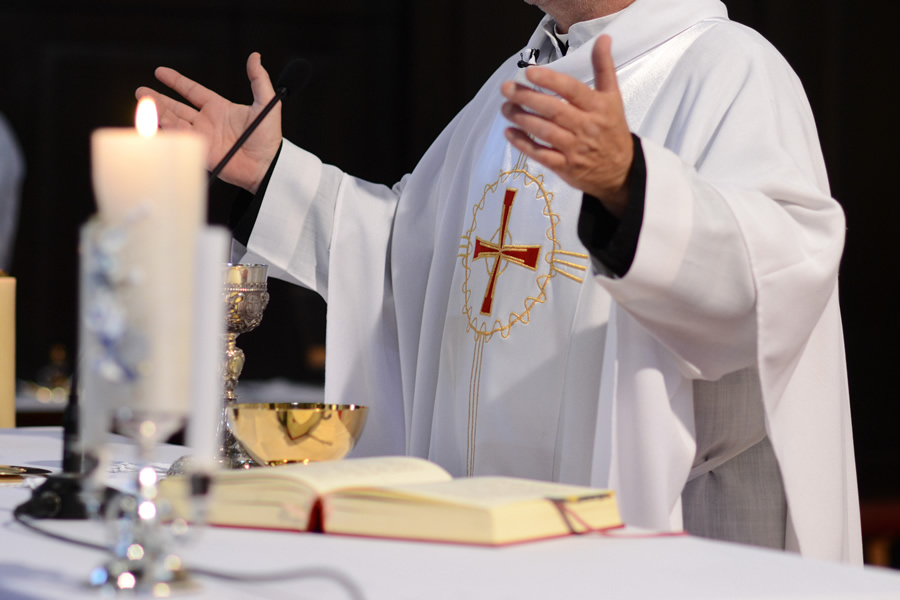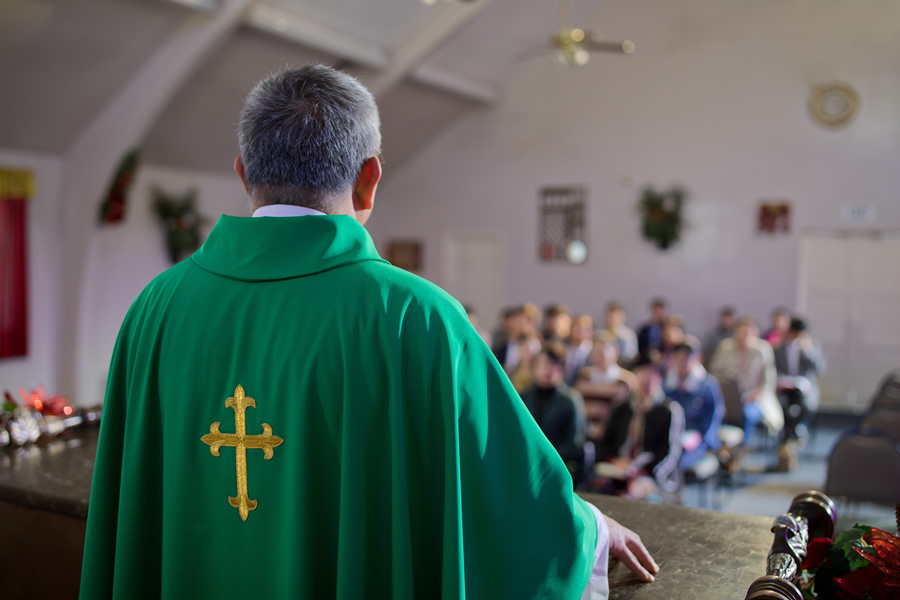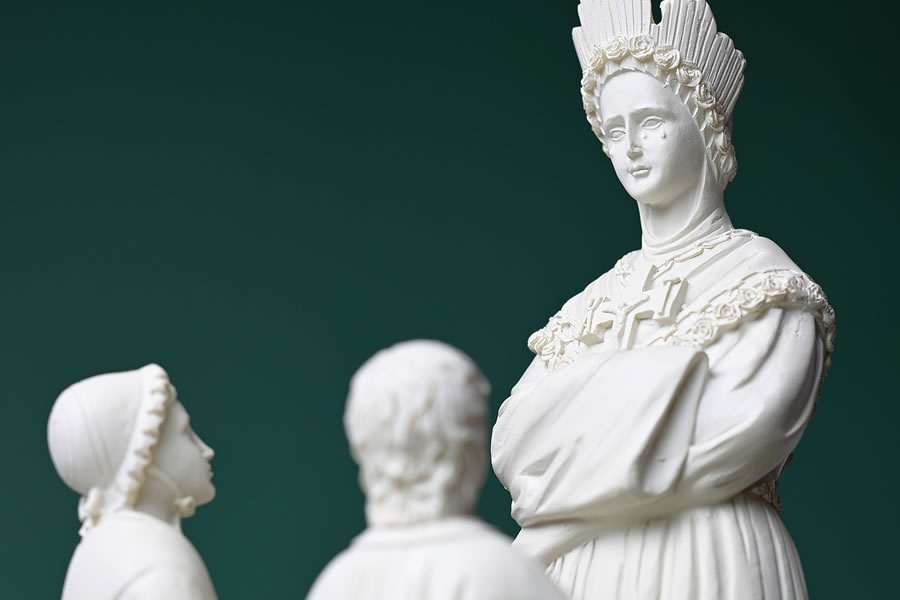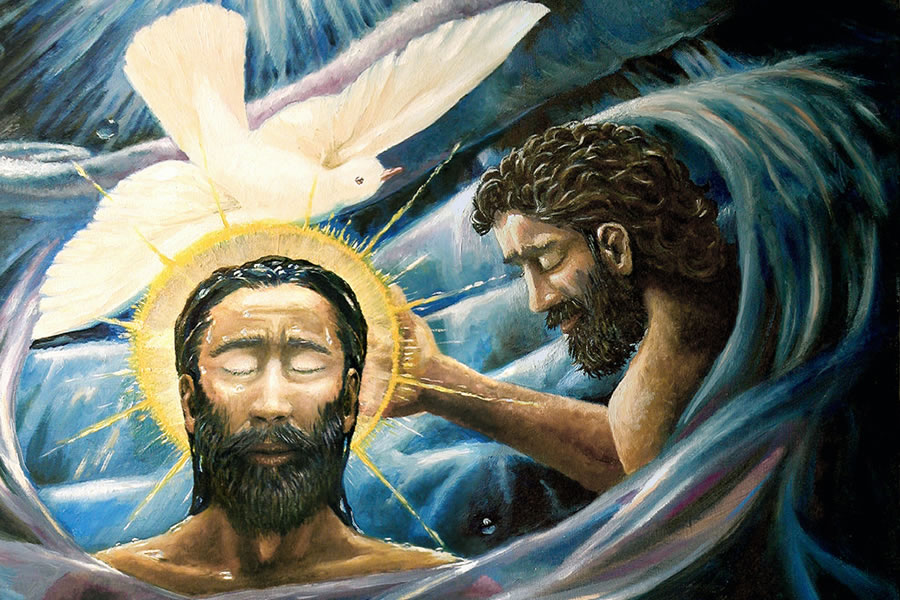
Lent & Rite of Christian Initiation of Adults
02-27-2022Weekly ReflectionBrian Guillot, Director of Faith FormationAs we prepare to enter another Lenten season, it is good to remind ourselves that this is not only a time of penance but of conversion as well. That is why there is such a close connection between Lent and the Rite of Christian Initiation of Adults (RCIA). You know that RCIA is a process for those over the age of seven wishing to become Catholic. Some enter the RCIA process as unbaptized people, called catechumens. While others join the process having been baptized in another Christian denomination. We call them candidates.
READ MORE
Brief History of Mass
02-20-2022Weekly ReflectionBrian Guillot, Director of Faith FormationThe Church has celebrated the Eucharist since Jesus’ Resurrection, but it has not always looked the same. Originally, the small Christian communities gathered for the evening meal in one of its members’ houses. Prayers, hymns, and even readings from one of Paul’s letters were included as parts of the meal. Of course, most importantly, the host blessed and shared bread and wine as the body and blood of Christ. St. Paul discusses some of the issues that arise as a result of these early liturgical gatherings in chapter 11 of the First Letter to the Corinthians.
READ MORE
Jesus elevated Marriage to a Sacrament
02-13-2022Weekly ReflectionJoseph Lukaszewski, Pastoral Care CoordinatorWhen two baptized people, one man and one woman, enter into marriage they bestow upon each other a Sacrament. For each of the other Sacraments the ordinary Minister is the Bishop, Priest, or Deacon. But in marriage the Bishop, Priest or Deacon is the Church’s witness of the Sacrament which the bride and groom bestow on each other.
READ MORE
Go Into the Deep with Christ
02-06-2022Weekly ReflectionFather Hans RuygtAre we controlled by fear? Does it hold us back? Is it preventing us from living fully?
Life is a series of adventures and risks. It seems these days, that a great many people are living in fear. We are afraid of a virus which we do not understand. We are afraid because we have seen so many stories of people who got sick or died, some were even friends, family, fellow parishioners, colleagues, or neighbors. We are afraid to be around people wearing masks or vice versa, people who don’t wear face masks. We are afraid of criminals, the loss of property or violence.
READ MORE
Changes in Understanding Confirmation
01-30-2022Weekly ReflectionBrian Guillot, Director of Faith FormationOf the Church’s three Sacraments of Initiation (Baptism, Confirmation, and Communion), Confirmation has undergone the most changes.
The Sacraments of Baptism and Eucharist existed in one form or another since the dawn of Christianity. Confirmation, however, has a more convoluted history. Originally, the Holy Spirit was conferred at Baptism with an anointing by the bishop following immersion. In the Eastern portion of Christianity, the post-baptismal rites were presided over by the priest who baptized; but, in the West, those rites were always reserved to the bishop.
READ MORE
Liturgical Colors
01-23-2022Weekly ReflectionBernadette Linde, Director of Music and LiturgyOur senses are piqued in many ways at Mass: the sounds of the music and choir, the aroma of the incense, and the images depicted in paintings and stained glass windows. A prominent way that our sense of sight is awakened and helps draw us deeper into the liturgy and its seasons is through the different colors of vestments the priest and deacon wear.
READ MORE
The Story of Our Lady of La Salette
01-16-2022Weekly ReflectionFr. Jacob Thomas Vettathu, MSBefore the apparition, La Salette was an unknown hamlet lost in one of those giant crevices of the French Alps. Early on September 19, 1846, the two children climb the slopes of the Mount Sous-Les- Baisses, each urging four cows up the mountain. Contrary to their habits, the two children lied down on the grass and fell asleep. The September sun was relaxing and the sky was cloudless. The chattering brook highlighted the mountain stillness. These were quiet moments.
READ MORE
The Meaning and Types of Baptism
01-09-2022Weekly ReflectionFr. Hans RuygtBaptism is the first sacrament a person may receive. It opens the door to the other sacraments and is normally followed by the sacraments of Confirmation and First Eucharist to complete one’s full initiation into the life of Christ within the Catholic Church. Baptism is so important that in danger of death, the Church allows laity to perform baptism with a simple rite pouring water and saying, “I baptize you in the name of the Father, and of the Son and of the Holy Spirit.” Nurses sometimes do this, but it must be done correctly and with the right intention.
READ MORE
What are your Priorities?
01-02-2022Weekly ReflectionJoseph Lukaszewski, Pastoral Care CoordinatorWhen was the last time you thought about what was most important in your life? It will likely be no surprise that no matter what your state of life the Church strongly suggests that you make God your first priority. But what should be number 2, or number 3, etc.? So many good things compete for our attention. Parents, children, family, spouse, friends, ourselves, strangers in need.
If God is our first priority then what order would He have us place the others?
READ MORE
Feast of the Holy Family
12-26-2021Weekly ReflectionBrian Guillot, Director of Faith FormationWe do not know any specifics about Jesus’ childhood or the domestic life of the Holy Family. The stories about the young Jesus found in Luke and Matthew are more concerned with the evangelists’ theological themes than with family life. Luke wanting to show the family as devout Jews with the stories of Jesus’ circumcision, Mary’s purification, and the family traveling to Jerusalem for Passover. Matthew wanting to show the universality of salvation with the story of the Magi, and Jesus as the new Moses with the flight to Egypt and the slaughter of the innocents.
READ MORE
Almost There!
12-19-2021Weekly ReflectionFr Nicholas Koro, A.J.On this fourth and last Sunday of advent before the great celebration of Christmas, we light the fourth candle of the Advent wreath called “Angel’s Candle”. This reminds us of the angels message that Jesus came to bring peace to our hearts and to our world.
Yes, after living through some tough times of the Corona virus pandemic, with fear, anxiety and uncertainties, it is another God’s acceptable time to trust deeper in Jesus Christ, the Prince of Peace and the source of true peace.
READ MORE
Advent and the Two Comings of Christ
12-12-2021Weekly ReflectionFr. Hans RuygtMost people think of Advent as the “Christmas Season,” but that really does not properly describe this time of preparation. As Catholics, the scriptures at Mass and all the prayers we use, draw our attention to the Second Coming of Christ at the end of our lives. It is only when we get close to the Feast of the Nativity of the Lord that that we see a transition in both the scriptures and the prayers of Mass and other official prayers of the season to focus on the First Coming of Christ to dwell with us.
READ MORE
Importance of Incense in Catholic Worship
12-05-2021Weekly ReflectionBernadette Linde, Director of Liturgy & MusicIncense has become a polarizing topic in the Church. Some love it, some hate it, very few are indifferent. But why do we use incense during Mass and why have we for centuries?
The use of incense in the liturgy is an important element for liturgical, theological, and historical reasons.
READ MORE